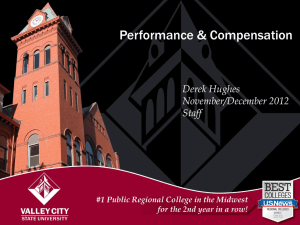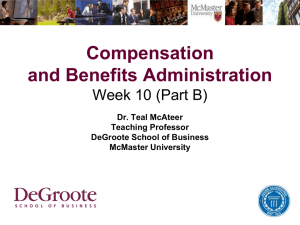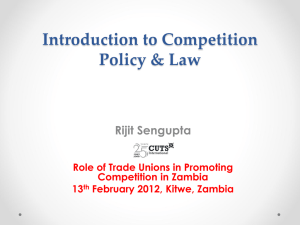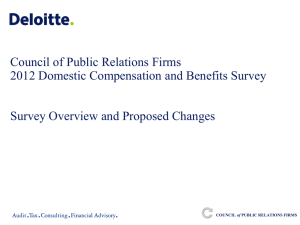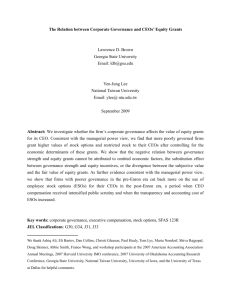Accounting_Firm_of_the_Future_presentation
advertisement
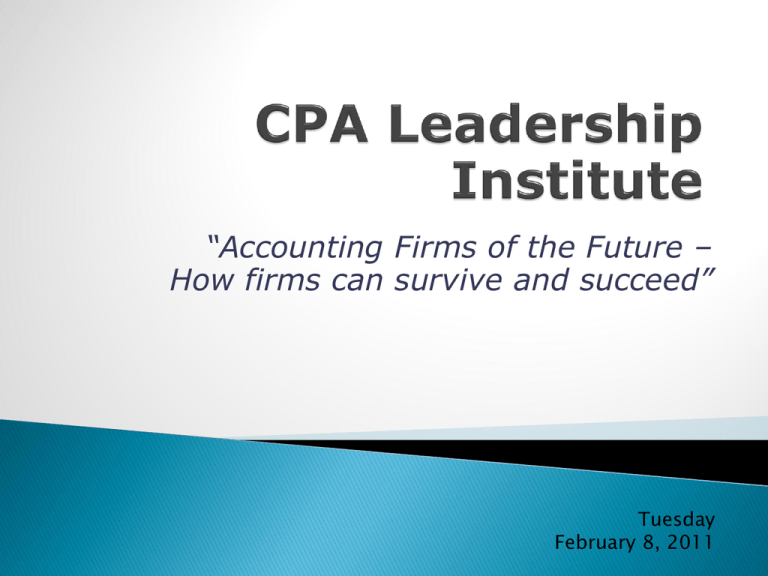
“Accounting Firms of the Future – How firms can survive and succeed” Tuesday February 8, 2011 CEO Koltin Consulting Group, Inc. Chicago, Illinois 1. 2. 3. 4. 5. 6. 7. 8. 9. 10. 11. 12. 13. Industry Update History Lesson 101 The Interrelationship of Strategy, Governance and Compensation as a firm grows Toughest Challenges as Firms Grow Lateral and Merged Partners Leadership Firm Profitability Using Partner Compensation to Improve the Firm’s (and Partners’) Performance Various Changes Necessary in Traditional Partnership Structures Necessary Changes to the Partner Agreement Mergers, Acquisitions and Divestitures Leaders as Change Agents Questions and Answers Industry Update Factor 2007 2008 2009 2010 Human Capital If only we could find the people. Mass layoffs at the Big 4, targeted layoffs at other firms More résumés? “Employer of Choice” now means ‘we’ have a choice! Profitability We’d better brace for a tough 2008. Many, many CPA Sacred Cows go firms realized home! record profits in 2008. No more “rabbits in the hat” Growth The last 5 years have been the best for growth since I’ve been in the profession. “The phones have stopped ringing – we need to get our partners back on the street.” Flat is up! Did we just go full circle on the “commodity thing?” Multiple rounds of staff layoffs No salary increases Across-the-board salary reductions (possibly with additional paid time off) Termination of partners Major cost-cutting initiatives Mandatory time off (PTO) during the summer months Pushing out start dates of new recruits and/or reducing starting salaries/rescinding offers Better WIP/AR management/work stoppage and payment plans The Big Four and the “Middle Market” ◦ Price wars like we’ve never seen before It only takes one “jerk” to screw up the market equilibrium Short- and long-term implications of pricing services at 30% - 50% below standard rates My “price fixing” lunch experience last month in New York! My crash course in “Big 4 pricing”! The pricing war will continue well beyond the end of the recession Guerilla Marketing Strategies are Back! RSM McGladrey/M&P Grant Thornton BDO Seidman CBIZ/MHM Crowe/Horwath BKD Moss Adams Plante Moran Baker Tilly VK EisnerAmper Clifton Gunderson JH Cohn Marcum LLP UHY Advisors LAWCo Dixon Hughes Reznick Group Parente Beard Rothstein Kass Weiser Mazars History Lesson 101 The Interrelationship of Strategy, Governance & Compensation as a Firm Grows Strategy Compensation Governance LIFE CYCLE 1 Revenue Up to $2 million Governance Committee, if at all! # of Partners 1–3 Biggest Worry Making payroll! Strategy “Anyone who can pay our bills is a worthy client.” LIFE CYCLE 2 Revenue $2-$5 million Governance Our compensation formula IS our governance. # of Partners 2–6 Biggest Worry How do I find time to work ON the business (vs. IN the business)? Strategy Differentiation – “With us you’ll get a ‘hands-on’ working partner vs. the ‘bait and switch’ that larger firms try to use.” LIFE CYCLE 3 Revenue $5-$10 million Governance Managing partner elected (more administration than real management). Also, management is not valued as highly as client service or new business. # of Partners 4 – 12 Biggest Worry Do we go out and invest in professional management or keep the partners doing “non-billable” things? How do we recruit, retain and grow younger talent? Strategy “Let’s start to specialize and really focus on industry/functional niches.” LIFE CYCLE 4 Revenue $10-$30 million Governance Managing Partner position gaining traction and trying to develop A&A and Tax Department leadership. # of Partners 8 – 40 (two-tiered partnerships more prevalent) Biggest Worry Range of efforts results in compensation beginning to spread wider amongst the partner group/retirement issues/change to compensation system. Strategy “Should we stay independent or merge up (or merge with an equal)? LIFE CYCLE 5 Revenue $30 million+ Governance True CEO and high-level, professional management. # of Partners Number based on revenue per partner. Typically between $1-$2 million revenue per partner. Biggest Worry How do we create: real depth and industry/service-line specialization, one-firm concept, and integrate mergers? Strategy “Should we expand geographically, be more aggressive in mergers and recruit lateral partners (free agents)? Biggest Challenges as Firms Grow Door #1 Door #2 Door #3 Ground Hog Day Major Reconstuctive Surgery Let’s Merge Up into Someone Else’s Playbook No Pain – No Gain Will look better, but at what cost? Interestingly, the results from doors 2 & 3 are the same Cruisers v. Dynamos Types of Services (Type 1 v. Type 2) Market Share/Desire to Expand Geographically Relationship v. Servicebased Partner Future Survival of the Firm Size of Firm Leadership Talent First v. MultiGeneration Firm Rainmaker “Lite” Number of Services Used ◦ 1 service ◦ 2 services ◦ 3 services ◦ 4 services ◦ 5 services Probable Retention Rate ◦ 12% ◦ 24% ◦ 63% ◦ 81% ◦ 98% Mandatory shift – from “renting” clients to actually “owning” them. Leadership Competitive Spirit Clutter Cohesiveness Candidness Crystal-Clear Vision Curious Contagious Enthusiasm Crazy! Change Agent Communication 1) 2) 3) 4) 5) 6) What professional characteristics would you want to see in the next MP? What personal characteristics would you want to see in the next MP? As you reflect on the biggest challenges facing the firm over the next 5 years, what are they? How should the MP’s performance be measured? Do you envision the structure of the MP position potentially changing in any way? Would this person be interested, have the backing of the other partners and give up their workload to make this position successful? Five-year strategic plan “Heavy lifting” – major issues effecting firm Mergers and acquisitions Hiring of lateral partners to the firm Litigation and business risk Advisor to the Managing Partner Ideas for new product and service lines Ambassador to carry the “Firm” message to other partners and associates Tax Department Leader – Job Description 1) 2) 3) 4) 5) 6) 7) 8) 9) 10) Empowered with overall responsibility to manage growth, profitability and overall resources of the Tax Department. Recruitment of new tax talent to the firm. Mentoring and development of existing tax staff and partners. Responsible for leading new product/service department ideas for the Tax Department. Oversight of tax training and technical issues as they relate to members of the Tax Department. Oversight of utilization scheduling and realization of Tax Department members. Establishment of tax members’ billing rates, as well as helping establish fees on larger tax engagements. Meets monthly (or quarterly) with tax partners and managers to coach and counsel them on individual performance. Responsible for overall client satisfaction (both internal and external clients of the firm). Helps promote the cross selling of tax services firm-wide, and also promotes cross selling of non-tax services within the Tax Department. Leadership Management Administration CEO/ COO $$$ $$ $ Executive Committee $$$ $$ $ Dept. Heads/PICs $$$ $$ $ What value do you place on each of these areas? How hard do you want to “push the gas pedal?” What kind of management talent do you really have? Firm Profitability Engagement Budget START FINISH Engagement Planning Staffing & Scheduling Client Acceptance Engagement Management/ Utilization The Client Client Satisfaction Collections Relationship Management Billing Surprises/ Change Orders/ Revisions of Completion Date Using Partner Compensation to Improve the Firm’s (and Partners’) Performance Unified Firm* Strategy/ Vision Individual Partner Goals Firm Governance/ Accountability *Includes Department, Office and Industry Team Goals PerformanceBased Partner Compensation Is Your Firm a Book-of-Business Firm? Originating Partner (Aggressive Alvin) CLIENT Relationship Partner (Loveable Larry) Service Partner (Billable Bob) “Average partner compensation will increase, but for the average partner, it will probably stay the same.” Daryl Ritchie, CEO of Meyers Norris Penny LLP OLD SCHOOL What is your book of business? How much new business did you bring in? How many billable hours did you have? How many years have you been a partner at the firm? I was one of the firm founders. NEW SCHOOL Who did you recruit to the firm last year? On the upward evaluation, how many people identified you as the reason they are with the firm? How many current and future partners would identify you as their “sponsor”? How did you rate on the partner peer survey? How did you rate on the client satisfaction survey? Agree on worth Doesn’t always make sense Values can change annually Occasionally have to over pay Individualized off-season training Individual goals & measurements differ Salary vs. risk dollars Open vs. closed compensation Formula approach vs. individual partner goals-based approach Various Changes Necessary in Traditional Partnership Structures One tier Two tiers Three tiers Four tiers Five tiers Six tiers Seven tiers ◦ equity only ◦ equity, income ◦ equity, limited equity, income ◦ equity, limited equity, income, principal ◦ equity, limited equity, income, principal, retired ◦ equity, limited equity, income, principal, retired, contract ◦ equity, limited equity, income, principal, retired, contract, special* *has not ‘officially’ retired but, based on performance, one would think they ought to! More activity in last 5 years than in last 20 years National firm partners have successfully integrated into local, regional and middlemarket national firms Many merged-in partners have thrived and assumed leadership roles in new firms Lateral and/or merged-in partners have become the #1 growth strategy of many Top 100 CPA firms! Lateral (and in some cases, merged-in) partners are now welcome, even without books of business Firms have changed their traditional partnership structure to better accommodate “outsiders” As firms have become more specialized (niche focused) the demand for building and growing expertise has gone up – hence the birth of “free agent” Rainmaking skills Leadership/management abilities Can assume someone else’s book of business Can help to leverage another partner’s book of business Has a unique or specialty expertise that the firm doesn’t have or wants to expand upon Firm is trying to fill in age, experience or diversity gaps in certain places Ability to take partner book and cross sell other services Necessary Changes to Partnership Agreement Non-solicitation provisions as they relate to: ◦ ◦ ◦ ◦ Clients Potential clients Staff Referral sources Mandatory retirement ◦ We have gone from age 65, to 62, to 60 to 58, and now back up to 70! Liquidated damage provisions when partners take clients ◦ 100% vs. 150% vs. 200%? Multiple of salary Ownership percentage (times revenue) Agreed upon fixed price None! *Also needs to address length of payout, vesting, payment restrictions, non-compete provisions, etc. Mergers and Acquisitions M&A Frenzy of 2010 is continuing in 2011 ◦ 2010 was a record year for mergers and acquisitions Top 100 firms continued their record pace Locals are becoming Regionals, Regionals are becoming Mega-Regionals, Mega-Regionals are becoming Nationals, and Nationals are becoming Internationals Firms in the $10-$30million fee range probably have the greatest challenges in the M&A area Mergers in the under $10 million size range are “off the chart!” 1) 2) 3) Firms don’t merge – people do! Remember to “drill down” to everyone’s personal agendas One size doesn’t fit all (cash for some, equity for others, a job for some!) Pick one! a) Fact: The more people involved in the merger discussion, the greater chances of it happening. b) Fiction: The more people involved in the merger discussion, the lesser the chance of it happening. c) See #1 (Clue – Do whatever it takes to “get the train running”!) 4) 5) 6) 7) Be careful what you wish for. Examples: Corporate v. Entrepreneurial Models “Troops on the ground” v. Flagship status How will life be different (if at all) on Monday morning? Don’t sweat the small stuff! Don’t underestimate the psychological effect of “giving up control.” Don’t forget to always understand the “other firm’s” perspective on things. Leaders as Change Agents Sometimes people don’t want to change, but will say they do. Sometimes people want to change, but can’t. Sometimes people want to change, but don’t know how to change. Sometimes people can’t change due to conflicting goals/demands. Sometimes people will change just enough to get you off their back! Sometimes people will change, but only if another person also changes. Sometimes people will initially change, but are only doing it to ultimately prove you wrong. Sometimes people will support the change, as long as they don’t actually have to change! “Don’t forget that the value of information is not in what you know. It is in what you know that sometimes the other person doesn’t know that you know!” To Contact Allan: 625 N. Michigan Avenue, Suite 2100 Chicago, IL 60611 312.245.1930 (phone) 312.245.1935 (fax) akoltin@koltin.com


